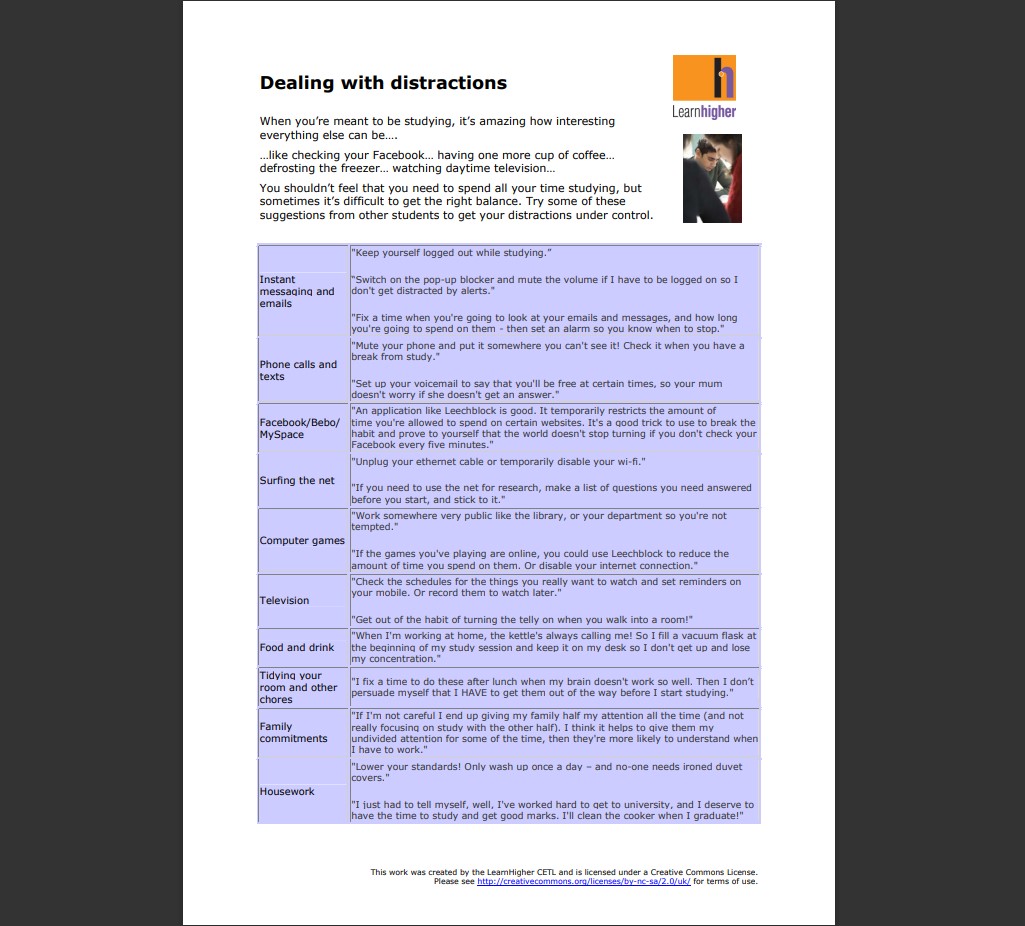We are constantly bombarded by things competing to attract our attention. So it’s not surprising that trying to avoid distractions is an issue, not only at university, but in all areas of life. It can be especially difficult when all the different areas of your life happen in the same place – for instance, when you write your research and organise your social life on the computer, or when the place you do most of your studying is also the place where you have home and family commitments.
We asked students at the University of Reading what their worst distractions were. Below are the top ten – click on any one to see the suggestions students made on how to deal with them.
The first step in getting control of your distractions is to identify them. Then get them in perspective and think in advance about strategies to deal with them.
Identifying your distractions
Start by identifying what it is that’s eating up your time. One thing you can do is to keep a time use diary – set an alarm on the hour and write down everything that you’ve been doing (be honest!). Sometimes the problem is that you’re trying to do two things at once, like reading a book and watching television. There are things that can double up usefully (for instance, thinking about a piece of work while jogging, or reading while commuting), but in other cases it just means doing two things badly, and not getting any satisfaction out of either. If your time-use diary says you’re spending all day studying, but you’re still not getting anywhere, ask yourself if doubling up is the problem. If it is, you need to think about setting some time and space boundaries between study activities and other activities.
Getting things in perspective
There are some things which we know we shouldn’t be allowing to distract us from studying because we only do them for our own enjoyment – playing computer games or watching television, for instance. Others we think of as essential and unavoidable, like shopping or washing up. Some come somewhere in between, like organising social events, or helping a friend – it’s not always easy to see how not to do them, especially if not doing them affects other people. One way to get things in perspective is to think about the consequences if we didn’t do them. For instance, what would be the consequences of:
- not organising your club’s social? (Someone else would do it? It wouldn’t get done?)
- not checking your Facebook for a whole morning? (you miss coffee with your friend? But she would have texted or phoned if it was really important…)
- not submitting your essay on time? (You might fail your course? Or lose 10% of your marks? Would that be a problem?)
- not letting the dog out before you go to your lecture? (And how much more time might it take you to clear up….)
- As you can see, thinking about consequences can be useful when deciding priorities!
Some possible strategies
Once you’ve worked out what it is that’s using your time, you can decide on a strategy to deal with it. Download the ideas from students at the University of Reading as a printable list (PDF). If the first thing you try doesn’t work, don’t give up. Be aware that everyone works differently, so not all suggestions will work for all students. Use the ideas that work for you, or adapt them to fit. If you have any tried and tested strategies for dealing with distractions, let us know. Your ideas could appear on this page to help other students.



Reviews
There are no reviews yet.